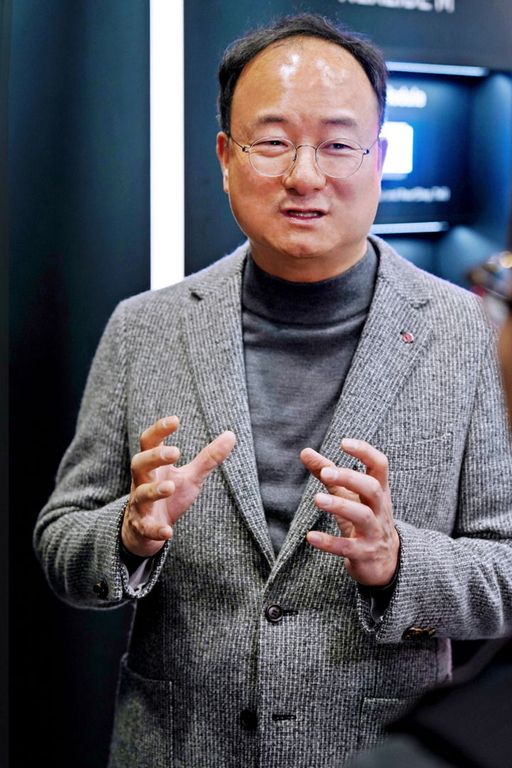


Moon Hyuk-soo, CEO of LG Innotek, announced that the company plans to cultivate the next-generation high-value semiconductor substrate business on a scale of trillions of KRW. He also expressed the intention to accelerate the discovery of new businesses such as mobility and robotics, based on the core technologies accumulated in the mobile sector.
CEO Moon said during an interview with reporters at CES 2025, the world's largest IT and electronics exhibition, held at the LVCC in Las Vegas on January 8 (local time), "In December last year, we began mass production of FC-BGA for North American big tech companies at our Gumi 4 plant in Gyeongsangbuk-do." This is seen as a significant achievement, marking two years since the company announced its entry into the FC-BGA business in 2022.
FC-BGA (Flip-Chip Ball Grid Array) is a next-generation substrate that allows AI semiconductor chips to be densely connected to the mainboard without wires. As the functionality of semiconductors increases, the substrates also grow larger, and FC-BGA is gaining attention as it can further enhance integration density, making it a promising new technology.
According to Fujifilm Research Institute, the global FC-BGA market size is expected to grow more than twice, from $8 billion (11.69 trillion KRW) in 2022 to $16.4 billion (23.97 trillion KRW) by 2030.
CEO Moon also mentioned, "We are actively pursuing development collaborations with several global big tech companies, in addition to North American big tech firms." He added that the company plans to actively explore external collaboration options, such as equity investments or mergers and acquisitions (M&A), to accelerate market penetration for the FC-BGA business.
At CES 2025, LG Innotek plans to foster the semiconductor component market as a key player by leading with FC-BGA, alongside the automotive AP module that was unveiled for the first time. The company aims to develop this business into a trillion-won scale.
LG Innotek announced through its corporate value enhancement (value-up) plan disclosed in November last year that it aims to grow the revenue from its new businesses to over 8 trillion KRW by 2030.
CEO Moon also mentioned the "glass substrate," which is advantageous for implementing fine circuits, stating, "We are now making investments in equipment," and added, "Starting at the end of this year, we will begin full-scale pilot production (prototype mass production) of glass substrates."
Glass substrates can replace the plastic-based core (center) with glass, which helps minimize circuit distortion.
CEO Moon stated, "(Glass substrates) are the direction we must go in, and many companies are currently weighing the timing for mass production." He added, "LG Innotek is also preparing to ensure we are not late to the game."
LG Innotek is applying its core technologies, such as camera modules, sensing, control, and substrates, which it has developed in the mobile sector, to various industries including mobility and robotics.
CEO Moon emphasized that, particularly in the rapidly growing humanoid sector in the era of generative AI, "LG Innotek is actively collaborating with leading companies in the humanoid field, leveraging its global leadership in camera technology."
Regarding Jensen Huang, CEO of NVIDIA, appearing on stage with 14 humanoid robots at the keynote speech ahead of the CES opening on January 6, CEO Moon stated, "We are collaborating with more than half of the companies that had humanoids on stage at that time."
CEO Moon also emphasized the importance of strategically managing global production sites and factory automation in the face of growing uncertainties surrounding U.S. trade policies and geopolitical tensions.
He stated, "The key task right now is to make our Mexico factory competitive in order to target the U.S. market," and added, "Although it requires significant investment, we will quickly expand factory automation in the process to secure cost competitiveness."
Regarding the competition from the Chinese camera module industry, he stated, "We will diversify production by using our Vietnam plant as a core base for manufacturing legacy camera module products for smartphones, while the domestic plant will focus on R&D, high-value-added camera modules, and optical components for new applications as a mother factory."
ChatGPT를 사용하여 번역한 기사입니다.


 Copyright ⓒ 메트로신문 & metroseoul.co.kr
Copyright ⓒ 메트로신문 & metroseoul.co.kr
Copyright ⓒ Metro. All rights reserved. (주)메트로미디어의 모든 기사 또는 컨텐츠에 대한 무단 전재ㆍ복사ㆍ배포를 금합니다.
주식회사 메트로미디어 · 서울특별시 종로구 자하문로17길 18 ㅣ Tel : 02. 721. 9800 / Fax : 02. 730. 2882
문의메일 : webmaster@metroseoul.co.kr ㅣ 대표이사 · 발행인 · 편집인 : 이장규 ㅣ 신문사업 등록번호 : 서울, 가00206
인터넷신문 등록번호 : 서울, 아02546 ㅣ 등록일 : 2013년 3월 20일 ㅣ 제호 : 메트로신문
사업자등록번호 : 242-88-00131 ISSN : 2635-9219 ㅣ 청소년 보호책임자 및 고충처리인 : 안대성